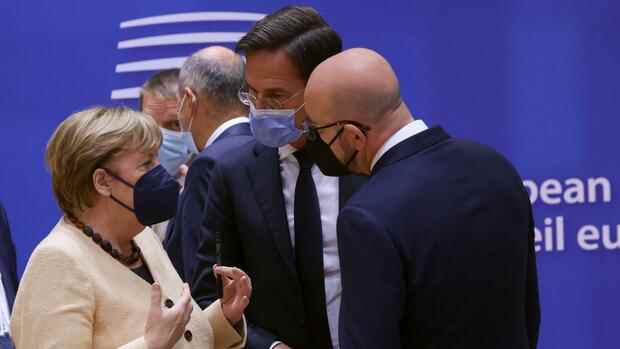The EU states could not agree on a common approach in view of the rising gas prices.
(Photo: dpa)
Brussels / Berlin As expected, the 27 EU heads of state and government were unable to agree on a uniform approach to tackling the high energy prices. During the deliberations on Thursday in Brussels, countries such as Spain, Italy and Greece demanded joint gas purchases by the EU countries.
At the insistence of Poland, Spain and the Czech Republic, a passage has now been added to the summit declaration that the EU should examine whether there is a need for regulation against certain trading practices when trading in CO2 certificates. The background is the suspicion that speculators are driving up the price of CO2 even more. In the summit declaration, reference is made to the package of measures proposed by the EU Commission as well as to the deliberations of the EU energy ministers on October 26th.
Even before the summit, Chancellor Angela Merkel urged a prudent approach to the debate about rising energy costs. The German government had praised the analysis of the EU Commission, which sees a number of reasons as the cause of the strong gas and energy prices, ranging from the improving global economy to the failure of gas pipelines.
In Eastern Europe, Russia was also accused of driving up prices. “I think that we should react prudently – we in Germany will certainly do that,” said Merkel. The Chancellor added, referring to the demands of some EU countries, that the market should not be switched off completely, “but rather, more market should be created.” The Netherlands also resisted market intervention. If necessary, there could be social support measures such as housing benefits in Germany, said Merkel.
Top jobs of the day
Find the best jobs now and
be notified by email.
The French government announced in the evening that it would provide relief to people with lower incomes in the event of rising energy prices. Prime Minister Jean Castex said that households with a monthly net income of less than 2000 euros should receive a one-off payment of 100 euros to offset the additional costs.
“We believe that the rise in prices is only temporary,” said Castex on French TV channel TF1. “But we cannot allow the rise to hinder the upturn”. According to Castex, 38 million people in France will benefit from the measure.
States want to tackle disinformation about vaccinations
In view of the sometimes dramatic corona situation in some EU countries, the EU also wants to do more against vaccination skepticism. In particular, disinformation in social networks must be combated, it said on Friday night in the conclusions of the EU summit in Brussels.
It is true that the vaccination campaigns in Europe have brought considerable progress. Nevertheless, the situation in some countries remains very serious. In Romania, for example, the 14-day incidence was recently almost 1000, according to the EU health authority ECDC. Only a good third of Romanians are fully vaccinated.
In the summit declaration, the heads of state and government also insist that travel to the EU and travel within the international community be further coordinated. Preparations for future crises of this kind must also be promoted.
The member states would have to be appropriately involved in managing the new EU authority Hera for the prevention of health crises. In addition, barriers to the global supply of vaccines should be removed. To this end, the EU Commission should deal directly with the manufacturers. In this way, the EU states could accelerate deliveries to the countries most in need.
More: Energy prices will not go down quickly. But if the right conclusions are drawn now, Europe will be able to react better in the future.
